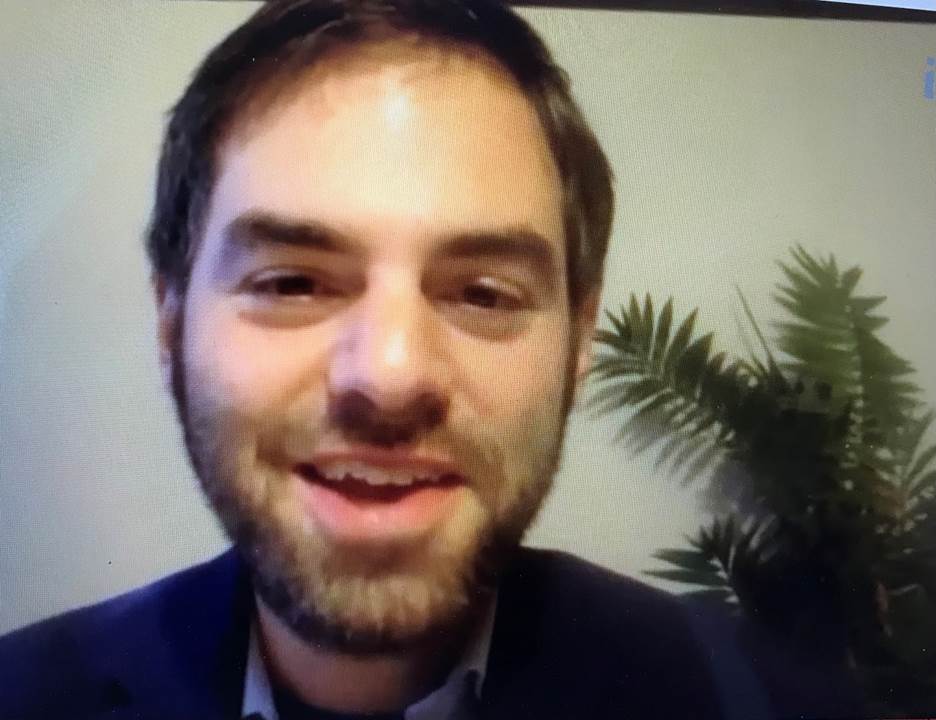
Michael Kugelman

Usama Nizamani
Michael Kugelman Reflects on Challenges for South Asia
By Elaine Pasquini

Washington: Michael Kugelman, director of the Wilson Center’s South Asia program, engaged in a candid and thoughtful conversation with Infer Digital research journalist Usama Nizamani on challenges and opportunities for South Asia amid shifting power structures on the February 1 episode of InferTalks, a digital platform co-founded last year by former Pakistan National Security Advisor Moeed Yusuf.
Responding to Nizamani’s comment that there is talk among Asia watchers that this will be the “Asian Century,” Kugelman agreed. “I really do think this is the Asian Century and it’s going to continue. I think we’re already seeing indications of that for many reasons – demographic, economic, geopolitical.”
Key geopolitical rivalries now playing out in the region include the dissension between India and China, along with US-China competition, Kugelman said, noting some of the biggest flashpoints in the world also are in Asia: the Taiwan straits, North Korea, the India-Pakistan friction and Kashmir’s struggle for self-determination.
“But I think on a positive point, if you just look at the economic patterns from Asia, some of the fastest-growing economies in recent years are in Asia and I think this will continue,” Kugelman noted. “There are going to be setbacks for sure, but I think that in the coming decades we’re going to continue to see major economic growth.” Southeast Asia also possesses a growing youth population where the median age in several countries is in the 20s.
Globally, the last few years, economies have slowed down due to the impact of the pandemic on supply chains, as well as price increases because of the war in Ukraine. “As long as the Russian war on Ukraine continues…South Asia is going to continue to face those same economic challenges,” he said.
Addressing power competition and regional rivalries, Kugelman recalled that India has had a lot of practice balancing rival relationships – including the one now between the US and Russia which dates back to the 1990s.
Presently, the United States essentially is willing to give India a “free pass” on its continued close partnership with Russia because India is perceived by the West as a “key counterweight to China,” he argued.
Regarding its relationship with China, Pakistan continues to be economically and commercially close with its neighbor, while at the same time recognizing the importance of its trade relations with the West and looking to build greater trade relationships with Gulf countries in the future.
On the subject of Afghanistan, and particularly whether the US will engage with the new government in Kabul, Kugelman said that due to US and Western sanctions on the Taliban he believes “the US and its Western partners have limited options in Afghanistan.”
Beyond providing humanitarian assistance, “the only thing that can be done is trying to figure out how additional assistance can be brought into Afghanistan that can help Afghans in ways that go beyond humanitarian aid but fall short of violating the sanctions,” he added.
On the Taliban’s human rights abuses and restrictive policies, particularly against women and girls, “There’s really nothing anyone outside of Afghanistan can do,” Kugelman stated. “There may be more practically minded Taliban leaders in Kabul that are concerned about being labeled a pariah and not getting legitimacy and recognition from the outside world which would limit its ability to get more assistance, but those in control of the Taliban right now – the real leaders in Kandahar…they’re ideological and hardline and they don’t care.”
Nizamani pointed out that Pakistan and the United States are interested in expanding their cooperation in tourism, climate change, IT and technology exports and pondered whether the countries would work together again on counterterrorism (CT).
Kugelman responded that with US forces out of Afghanistan, Washington doesn’t have as strong of a strategic incentive to partner with Pakistan on CT issues. “Since we don’t have Americans in Afghanistan, terrorism is not an immediate threat to US interests and to US personnel as it had been previously,” he stated. “But we’ve always seen the US look at Afghanistan through a CT lens and Islamic State Khorasan (IS-K) is certainly a group the US is trying to keep an eye on.”
“I think the TTP (Tehrik-e-Taliban Pakistan) issue is clearly the prominent concern for Pakistan,” he said. “It’s not as much of a concern for the US because the TTP doesn’t threaten the US…the TTP seems to be fully focused on Pakistan right now.”
Realistically, there may be the possibility of stepped-up intelligence cooperation between the US and Pakistan to better monitor the movements and locations of TTP, IS-K and al-Qaeda, Kugelman added. But, “the US has moved on,” he pointed out.
Going forward in the new year, Pakistan’s economic situation will be the top priority, Kugelman said. Avoiding a default on loans and obtaining the International Monetary Fund package are essential. “My sense is that Pakistan has a good chance of avoiding a default and I imagine the IMF will eventually come around,” he opined. After that, the focus should be on “some type of clear economic recovery plan.”
The upcoming election is the other key issue the country is facing, and whether the present government stays or a new one comes in, Kugelman concluded, “less polarization” would make it easier for whoever is in power to focus on the economy.
(Elaine Pasquini is a freelance journalist. Her reports appear in the Washington Report on Middle East Affairs and Nuze.Ink.)

